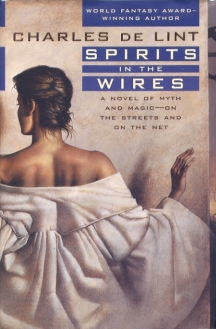Talk slow, think fast, read faster
The Agony Column for October 22, 2003
Commentary by Rick Kleffel
"Sometimes it seems we are approaching a point where our senses and our minds will no longer respond to moderate stimulation." Spiro Agnew
It's important to keep that bit of balance in mind when planning -- or unplanning -- your reading schedule. As much as I seem to look forward to reading book X, I find myself constantly re-scheduling to read books S, T and W, which just arrived and whose authors are touring to support their work. Usually, I've read a number of books by X, and none by S, T or W. I might even have books by S, T or W that I've not got round to reading. Which explains what you've seen reviewed around here by me, what 's in the queue, and in the News section. I've been pounding my way through the bush of books since I got back from Worldcon with nary a break in the action.
Tor's found a nice illustrator for these covers.
I was actually at WorldCon while I read Charles De Lint's 'Spirits in the Wires'. I'd read De Lint years ago during the Horror Boom of the 1980's, but since then, nothing, zero, nada, zip. This is only because of bandwidth limitations, not lack of interest. While I was away, De Lint has been building up a very nice little sort-of-series of books, the Newford novels. While they all center on the same city, and feature the same characters in the background, the main characters of each novel are new and created for that novel. This keeps the series both connected and accessible to new readers. In 'Spirits of the Wires' De Lint easily conquered my first worry, which was that since he's primarily known as a fantasy writer, he would be fuzzy on the computer background of his story of spirits who migrate from the fields to the Internet. No worries; he had his hardware down, in many respects better than some cyberpunks. In conversation, he proved to be a passionate guy who was a bit difficult to pin down, not because he was evasive, but rather expansive. We talked about reprinting his old horror and heroic fantasy novels and his love for the familiar characters who appear in all the Newford novels.
 |
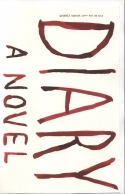 |
I'd hardly finished that novel and interview when I found myself launched into my next with author Chuck Palahniuk. I'd talked to Chuck almost a year ago, when I first started doing interviews for KUSP and NPR. At the time I was massively nervous, so much so that he signed one of my books with the inscription "Rick -- relax!" This was advice I took to heart. At that time, he told me that he was interested in writing horror. After the interview, I went home and found a copy of 'Talking in the Dark', the Stealth Press "best of" Dennis Etchison, because I thought that it was the best horror that was most like Chuck's work. I handed it to him the cluttered alcove in the back room at Capitola Book Café where they hide the authors before their signings. Afterwards I felt pretty sheepish -- what the hell does this bestselling author want with a book from me? I filed giving writers books under "Behavior Best Avoided", and moved on. But I was well prepared for this year's interview. I'd read 'Diary' well before the interview, and his travel book 'Fugitives and Refugees' as well. Even Terry D'Auray had read and enjoyed 'Diary' by the time of the interview, and I had input from her for my questions.
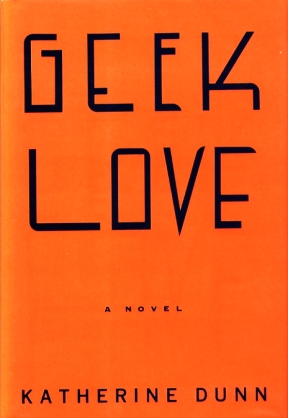 |
|
I don't believe that I have shown this early Chip Kidd dust jacket quite enough times yet. |
This time when I talked to him I was not nervous, and found myself surprised that he had actually read the Etchison, as well as Stephen King's book 'On Writing'. [Still, I kept the rule about giving books.] He even answered the thorny question about Katherine Dunn, who wrote the iconic novel 'Geek Love': "When is her next novel coming out?" He told me questions like that were why she stopped touring. But the answer is soon, we hope, soon, and according to Chuck, it will be a novel about serial killers that should surpass much of what we've read thus far. It seems like a good match. I know that there are many like myself, even those who are not in the habit of reading horror, who hold Dunn's novel in high regard. I suspect that any new novel by Dunn has definite bestseller potential. More importantly, it sounds like a potentially great reading experience.
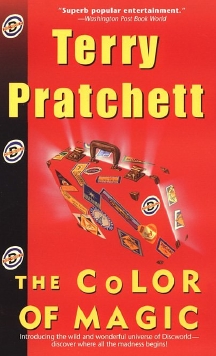 |
|
Pay attention! That suitcase is more important and dangerous than you think. |
But even as I was interviewing Palahniuk, I was reading to prepare for another interview almost a month down the line, with Terry Pratchett. So, on one hand, I'm interviewing the Dark Prince of Minimalism, on the other, I'm reading the mastermind of funny, satiric fantasy. More than a bit of cognitive dissonance going on. I'd seen Pratchett at Worldcon and found him thoroughly entertaining. In preparing for the interview, I really wanted to read a range of his writing, from his first Discworld novel to his latest children's novel to his latest Discworld novel. At the convention, he'd been asked which was his favorite novel, and answered 'Night Watch', so I put that in the queue as well. Pratchett has a huge history in science fiction, one that I'd studiously ignored, even though I'd read his collaboration with Neil Gaiman, 'Good Omens' and enjoyed it immensely. I enjoyed him enough at Worldcon that I made a very conscious decision to read a lot of Pratchett. I told myself it was to support the interview, but it was also because I was forcing myself to read something that I really wanted to read. Pratchett offers me -- and apparently lots of other people -- a very easy and fun read that has lots of resonance. When I was interviewing Chuck Palahniuk, I was reading 'The Color of Magic', Pratchett's first Discworld novel.
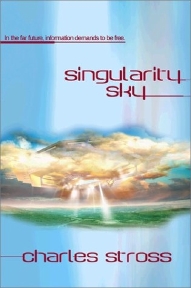 |
|
Buy this book for someone you know who likes science fiction. They'll thank you and think you're really smart. |
Having finished the Palahniuk interview -- and my first Terry Pratchett novel -- I felt I was owed a bit of reading reward. (Beyond the many upcoming Pratchett novels.) Sure, I was scheduled to interview Win and Meredith Blevins in little more than two weeks, but I'd decided that I didn't need to read the novels. In the first place, both novels were outside my normal reading zone. Moreover, I was interviewing this fascinating husband and wife team together, I had a mere 22 minutes to fill and they were going to play music. I figured there was something wrong with me if I couldn't wing a good interview out of them without having read their books. So I get to read 'Singularity Sky' by Charles Stross, admittedly because I had hoped to interview him at Worldcon. And I really liked Charlie's novel, but realized that I was still in a sense retroactively preparing for an interview I'd never got round to doing. But it's one I still hope to conduct via email. 'Singularity Sky' has a feel rather similar to 'The Color of Magic'. Both writers combine a sort of silly science fictional and fantastic imagination with lots of sly satire of both current events and the genre they're working in. But both are also dense with linguistic and philosophic invention. And both authors also manage to give a gritty sort of here-and-now feel to fantastically furnished worlds.
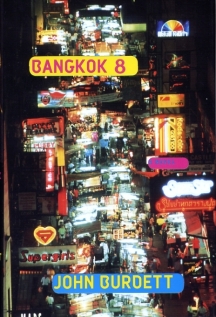 |
|
Check out the News column of 08-18-03 to see all the layers of this complex DJ art by Chip Kidd. |
But now I was looking for something a bit more on the actual here-and-now side of the equation. "Relaxing" my reading, since I'm still thinking I'm not going to read those Blevins' books, I decide to read a nice, gritty mystery. Since I'd actually gone out a while ago, bought the book and carefully scanned in the cover, I decided to opt next for John Burdett's 'Bangkok 8'. If I was hoping to escape the fantastic, I'd made a bad choice. Burdett's novel was set in as alien a landscape as 'Singularity Sky', modern day Bangkok, and told from an alien point of view --that of a Buddhist cop hoping to solve a case that's tied to the murder of his partner. It's very weird, almost science fictional in tone and content. The Buddhist narrator sees his world in a profoundly different manner from the Western reader; hungry ghosts haunt the hotels and spirits stalk the streets. It's written in extremely short chapters, which makes it easy to read, but one feels guilty reading books written in this style. It's a tacit admission that we're all too busy to really focus on our reading, and emblematic of bestseller-stylings. When the prose is as carefully written as in Burdett's 'Bangkok 8', there's a kind of clash of cultures that happens on the page in front of you. Still, it does make it easier to read, no doubt. My intention was to quickly devour Bangkok 8'.
 |
|
A timely new book from the man who first allowed us to see what the government was doing in our name. |
On the other hand, while reading John Burdett's book, I'd helped host a show of Fine Print with Jenn Ramage. While my interview of David Corbett played in the background, Jenn and I talked about our upcoming schedules; I was interviewing the Blevins, Jonthan Lethem then Terry Pratchett. She confided that she was trying to make it through Daniel Ellsberg's monumental autobiography, 'Secrets: A Memoir of Vietnam and the Pentagon Papers'. It's a long book, and we typically don't have much time. She was getting nervous at the thought of the interview. It certainly wasn't a normal deal. Ellsberg was appearing at the Rio Theater, not the bookstore. While Jenn worried, so professional and so concerned, I re-thought my intention to skip reading the novels of the Blevins. Maybe I should read them, I decided. I'd read them on our family road trip, while my wife drove the van to Southern California and back for a weekend visit with my mother. But it would mean reading 800 pages in about a week. I manage to read a lot of books not by virtue of being a fast reader, but rather by reading a lot. Fortuantely, a road trip is just the thing for reading, as long as I'm not driving.
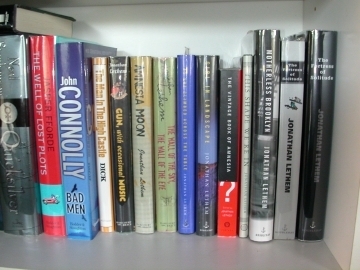 |
|
A whole bunch of Jonathan Lethem books to read before the interview. Which ones shall I read? |
Burdett's book was wonderful, but I didn't end up reading it particularly fast. Jenn interviewed Daniel Ellsberg. He was not appearing at the bookstore, but at the Rio Theater because the audience was so large. He prominently mentioned that Jenn's interview was one of the best he'd ever done. That completed my head-swivel with regards to reading the Blevins' books. But I was also caught up in the process of getting the interview for Jonathan Lethem set up. It turned out that I would have to do the interview in San Francisco, at KQED studios. I knew I would feel like The Country Mouse. But I really wanted to be prepared. My take on being prepared involves finding and buying first edition hardcover books of the authors I'm interviewing, if possible. I had tried this with Terry Pratchett, but first edition hardcovers of 'The Color of Magic' sell for about $8,000.00. That's a bit beyond my current budget. Like three Astronomical Units beyond. But with Lethem it proved to be a bit easier. I bought most of the titles from Bell Luna, and one from the venerable L. W. Currey. I'd read 'The Fortress of Solitude' at the beginning of August, so I wanted to reconnect with Lethem's writing before the interview. And thus, in the space of two days before the trip, I got in five nice new books that I also wanted to read. But in the haste before the trip, I barely had time to stack them on the desk next to the archival iMac.
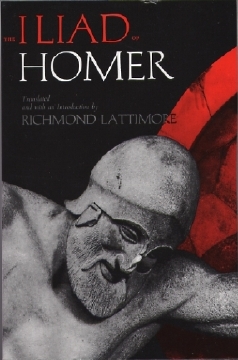 |
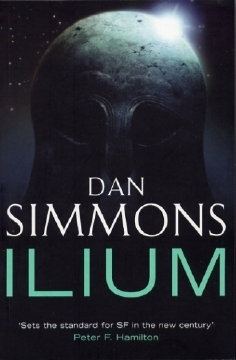 |
And, in my folly, I thought I would start reading 'The Illiad'. I did in fact start reading the Richard Lattimore translation while reading Burdett's book. My goal was to prepare for yet another book, Dan Simmons 'Ilium'. Simmons' 'Ilium' is based on 'The Iliad'. And damn, if I'd kept reading, I'd be done by now. But after two sessions, I found myself compelled by the Blevins to get cracking and pay attention to the reading for the interviews. And so 'The Illiad' fell onto my newly purchased rolling book stand. Otherwise, the piles of books were going to take over the entire living room.
 |
|
This book is wonderfully well-written, exciting and moving. |
By the time we left on our little weekend trip, I'd enjoyed the hell out of Burdett's 'Bangkok 8', and loaned it to Terry D'Auray, because she only has about 472 books to read. But like most of my readers, I knew she'd get a kick out of it. I got in the car and started Win Blevin's 'So Wild A Dream'. (I wasn't driving.) 'So Wild A Dream' is a historical novel set in the fur-trapping trade in America in the 1820's. I chose it because it seemed to me to offer the greatest challenge. It's not a subject that jumps out at me, or a time and place I was all that interested in, at least until I got about 40 pages into Win's novel. By then I was ready to change my tune. Turns out, at least when Win Blevins writes about it, I am interested in the first explorers of Western America. Win is a poetic and pure writer. This coming-of-age novel took me about, as I said, 40 pages to get acclimatized to. But good writing will pull the reader in even if the reader is disinterested in the subject. Win has created an archetypal character in Sam Morgan and sent him on an authentic adventure carefully woven into the tales of actual explorers and trappers of the time. Reading this novel took me right back to my own childhood, when I sat and watched "Davy Crockett" and Walt Disney before he'd become an animatronic puppet. It connected to the reader in me on a very basic level, and I think that a lot of science fiction readers might also enjoy it on that level. Sam Morgan's world is filled with the kinds of details that SF readers enjoy, the nuts-and-bolts descriptions, as well as a strong emotional component. Yet here was a novel I wasn't going to bother to read, didn't think I would like until I opened it and read it and read first because I thought it would be a harder book to read. Annihilate your expectations and always do your homework.
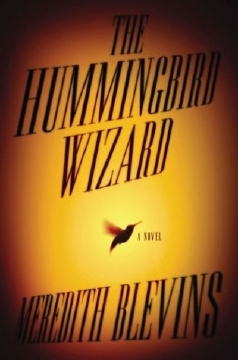 |
|
Meredith informed me in her interview that the titles of the books will all be derived from Tarot cards. |
Meredith Blevins' 'The Hummingbird Wizard' had a lot more initial appeal to me; gypsies, mystery and magic. By the time I finished Win's novel, I was in a sublime place of peace. Sam Morgan's journey was an exciting adventure, and in the endpapers of the book, I read that most of the ancillary characters, whom I thought to be colorful inventions, were in fact real. The bigger-than-life-seeming adventure was pretty much a recollection of actual life, rendered big by great writing. The jump into his wife's book was not long, but once again, I found myself rather confounded by my expectations. What I'd expected was that Meredith's novel would offer mystery and a little bit of terror. But once I stared, it was clear that there would be no terror whatsoever. What it did offer was a great cast of mouthy women, a couple of whom were gypsies, navigating the emotional minefield around a funeral with humor and wit. Once I'd got my head round the fact that the men in the novel were strictly second bananas, I found my reading wits and enjoyed myself. Reading the 'The Hummingbird Wizard' was like sitting next to two motor-mouth women in a restaurant who are talking in a slight accent and yakking incessantly in a conversation that's much more interesting than anything else around you. As Meredith Blevins finds her characters, they clearly grow on the reader and the writer. It becomes an involving novel. It definitely left me wanting to read more about Madame Mina, and seemed like the kind of novel that could really appeal to a vast audience.
 |
|
Terry Pratchett's artful, poetic novel of hilarious little gnome-like thingies. |
Before I finished 'The Hummingbird Wizard', I'd started scripting the interview with the Blevins in a different fashion than usual. What I'd done thus far was to simply write down questions I might want to ask in an order I might want to ask them in. But interviewing two authors would require a much looser format. This time round, I simply wrote in bullet points, sub-heads and bold face categories -- even a few fully-scripted questions -- on a single sheet of paper, trusting I could generate most questions on the fly, and would need to as I tried to create some sort of equilibrium between the three of us. I finished Meredith's novel on the day before they were to be interviewed, started on my second read in preparation for the Terry Pratchett interview, 'The Wee Free Men' and wrote up the review of Meredith's novel literally an hour or so before I was to interview them.
The Blevins proved to be not only entertaining to read but wonderful to interview. I felt like I was interviewing Tom and Ray Magliazzi, the 'Car Talk' guys because we all just kept laughing. The flow between the two writers was great; their work is nicely complimentary. Readers who are on the fence about whether or not to pick up the books should definitely give the interview a listen. It might help tip the balance towards reading the books, and you'll thank me for that. For one thing, the books will make a nice break from your steady diet of genre fiction, big-screen space operas, civilizations about to fall, solo detectives and serial killers on the prowl, vampires lost in lust and bloodlust. Of course, at the time I was just lurching into my second foray in Discworld. But I can certainly tell you that I was glad to hear that Win already had book two in his series completed, and that Meredith was well into her second book. The authors' energy was contagious.
But the Blevins weren't the end of my reading assignments. I'd learned that, as a reader I need to push myself out of my easy-choice categories even more often. But it feels like I do that all the time. I'd also found a new way of formatting written prep for a face-to-face interview. I'd also lined up something like ten novels to read in the following two weeks. The only reasonable response was to talk slower, think fast and read faster.
